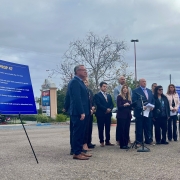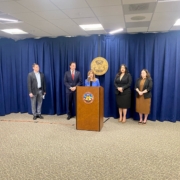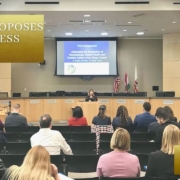San Diego County District Attorney Summer Stephan was joined today by the mayors from cities across San Diego County as well as business leaders, crime victims and other concerned citizens in an effort to inform the public and boost signature gathering to place the Homelessness, Drug Addiction, and Theft Reduction Act on the November ballot. The measure would make communities, businesses, and streets safer and healthier by restoring the rule of law, holding repeat retail thieves and fentanyl dealers better accountable, and incentivizing individuals who are addicted and homeless to accept life-saving treatment.
The following mayors are all supporting the signature gathering effort: Vista Mayor John Franklin, Escondido Mayor Dane White, El Cajon Mayor Bill Wells, National City Mayor Ron Morrison, Chula Vista Mayor John McCann, San Marcos Mayor Rebecca Jones, La Mesa Mayor Mark Arapostathis, Santee Mayor John Minto, Oceanside Mayor Esther Sanchez, Coronado Mayor Richard Bailey, Carlsbad Mayor Keith Blackburn, Solana Beach Mayor Lesa Heebner, Encinitas Mayor Tony Kranz, and Poway Mayor Steve Vaus.
[WATCH LIVE STREAM OF NEWS CONFERENCE HERE]
“This is a balanced, commonsense initiative that addresses the fentanyl crisis by going after drug dealers who are killing our loved ones and imposes stronger penalties for repeat offenders of organized retail theft, which is hurting far too many families and local businesses,” said DA Stephan. “We need responsible reform that allows judges to incentivize life-saving treatment for those struggling with severe addiction, holds repeat offenders accountable but also gives first, second, and even third chances for those who commit theft or possess hard drugs to be treated for addiction or mental illness. Voters should have the opportunity to debate and weigh in on this important initiative.”
The measure has collected more than 360,000 signatures from California voters to place it on the November ballot, but nearly 550,000 valid signatures are needed.
The ballot measure is designed to fix the unintended consequences and harmful impacts of Proposition 47, which passed in 2014 and— for example— made retail theft under $950 and drug possession of methamphetamine and fentanyl into misdemeanors no matter how many times the crime is repeated.
“Neighborhood markets are the lifeblood of our communities,” said Neighborhood Market Association President Arkan Somo. “Proposition 47 unleashed a tidal wave of theft and violence that harms our small business owners, their employees and families, and most importantly, our customers. This proposed ballot measure will give law enforcement the tools it needs to keep all of us safe. “
Unintended Consequences of Prop 47 and current laws include:
- Homelessness increased 51% in California while decreasing 11% in states with more balanced laws.
- Homeless individuals in San Diego County are dying of drug overdoses at a rate 118 times higher than the general public.
- Overdose deaths from illicit fentanyl have more than tripled, claiming more young lives in San Diego County than any other cause.
- Organized retail theft has exploded, resulting in massive economic losses, losses of jobs caused by store closures, and losses of essential goods for struggling neighborhoods.
- Fentanyl dealers who cause overdose deaths generally receive minimal consequences under the law.
- Drug Courts that offer effective treatment have lost their ability to incentivize those who commit crimes driven by addiction to engage in treatment.
A recent survey showed that more than 85% of voters across every political party and each demographic support reforming Proposition 47.
“This initiative is a balanced approach that gives our justice system the tools they need to protect our communities from criminals while also providing an opportunity for people suffering from addiction to get back on their feet,” said Coronado Mayor Richard Bailey. “Current policies have contributed to the rise in crime and homelessness throughout the state over the past decade, but this initiative will help reverse those trends and make California a safe place to live and do business once again.”
“As a retired San Diego Police Officer and Detective with 29 years of law enforcement experience, I possess a firsthand understanding of the adverse effects of Proposition 47 on the lives of Californians,” Santee Mayor John Minto said. “This initiative is a crucial step towards addressing the rising challenges of homelessness, drug addiction, and theft that plague our communities. Californians, including the residents of Santee, are demanding relief from the escalating lawlessness that has driven up the cost of goods statewide.”
Oceanside Mayor and retired public defender Esther Sanchez said, “The unintended consequences of Prop 47 took out the highly successful drug court program, leading to increased drug addiction and crime and in effect tying the hands of law enforcement protecting our neighborhoods and businesses. This citizens’ initiative gives back tools our communities need to help residents, many times family members, face their addictions and crimes while offering support and a path toward a life with positive options, such as family reunification, a home and jobs.”
The Homelessness, Drug Addiction, and Theft Reduction Act would allow for stronger penalties for those engaged in the trafficking of hard drugs or for repeat offenders of retail theft. It will still give first and second chances for those who commit theft and possess hard drugs to be treated with a misdemeanor. However, on the third conviction, there’s a requirement that drug treatment be completed to earn a misdemeanor or be held accountable for a felony creating a new category of “Treatment Mandated Felony.” A fourth conviction results in a felony crime.
This initiative will also allow aggregation of multiple thefts to reach the $950 threshold to charge a felony theft so that those that are gaming the system can be stopped. The initiative addresses the fentanyl crisis by allowing harsher penalties fentanyl drug dealers whose actions lead to overdose deaths.
Signature gathering for the Homelessness, Drug Addiction, and Theft Reduction Act will take place in the coming weeks across the county and the public is encouraged to seek out opportunities to sign the petition.


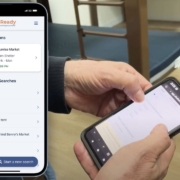
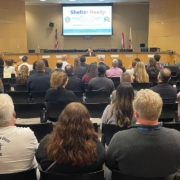
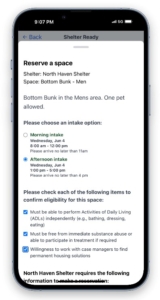 Shelter Ready is a transparent and efficient platform that helps frontline workers quickly locate and refer unsheltered individuals to appropriate shelter beds. It was developed in partnership with a national technology nonprofit and informed by input from dozens of San Diego County agencies. Over the past several months, the app has been piloted successfully in the North County with several local organizations and is now being made available countywide—at no cost—through leadership from the DA’s Office.
Shelter Ready is a transparent and efficient platform that helps frontline workers quickly locate and refer unsheltered individuals to appropriate shelter beds. It was developed in partnership with a national technology nonprofit and informed by input from dozens of San Diego County agencies. Over the past several months, the app has been piloted successfully in the North County with several local organizations and is now being made available countywide—at no cost—through leadership from the DA’s Office. 

